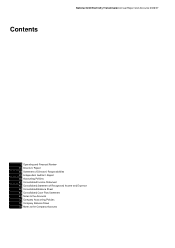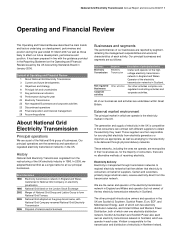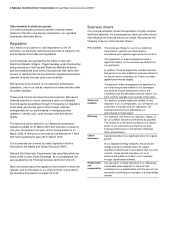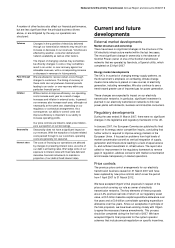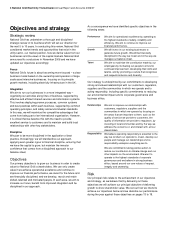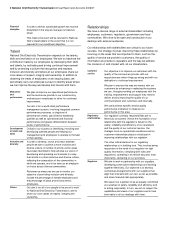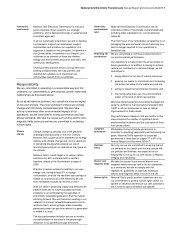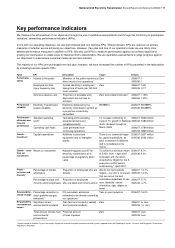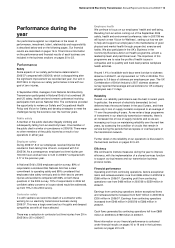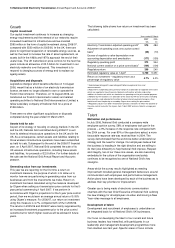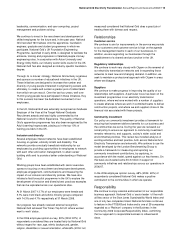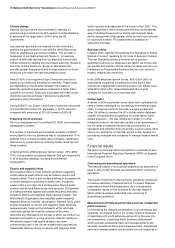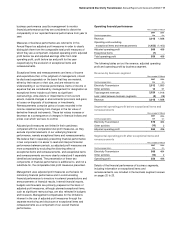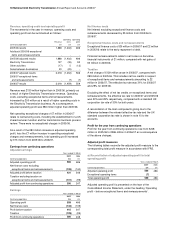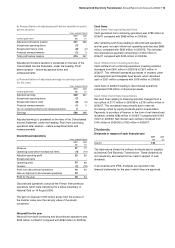National Grid 2007 Annual Report Download - page 11
Download and view the complete annual report
Please find page 11 of the 2007 National Grid annual report below. You can navigate through the pages in the report by either clicking on the pages listed below, or by using the keyword search tool below to find specific information within the annual report. National Grid Electricity Transmission Annual Report and Accounts 2006/07 9
Network failure or the inability to carry out critical non-
network operations may have significant adverse impacts
on both our financial position and our reputation.
We may suffer a major network failure or may not be able to
carry out critical non-network operations. Operational
performance could be adversely affected by a failure to
maintain the health of the system or network, inadequate
forecasting of demand or inadequate record keeping. This could
cause us to fail to meet agreed standards of service or be in
breach of a licence or approval, and even incidents that do not
amount to a breach could result in adverse regulatory and
financial consequences, as well as harming our reputation. In
addition to these risks, we may be affected by other potential
events that are largely outside of our control such as the impact
of weather or unlawful acts of third parties. Weather conditions
can affect financial performance and severe weather that
causes outages or damages infrastructure will adversely affect
operational and potentially business performance. Terrorist
attack, sabotage or other intentional acts may also physically
damage our businesses or otherwise significantly affect
corporate activities and as a consequence adversely impact the
results of operations.
Our results of operations depend on a number of factors
relating to business performance including performance
against regulatory targets and the delivery of anticipated
cost and efficiency savings.
Earnings maintenance and growth from our regulated electricity
business will be affected by our ability to meet or better
efficiency targets set by or agreed with Ofgem and other
regulators. Earnings from our regulated business will be
affected by our ability to recover incurred expenditure. Levels of
earnings also depend on meeting service quality standards set
by regulators. In addition, from time to time, we also publish
cost and efficiency savings targets for our regulated business.
We are also reorganising our operations along lines of
business. To meet these targets and standards, we must
continue to improve operational performance, service reliability
and customer service. If we do not meet these targets and
standards, we are not able to recover incurred expenditure or
we do not implement this reorganisation as envisaged, we may
not achieve the expected benefits, our business may be
adversely affected and our performance, results of operations
and our reputation may be harmed.
Changes to the regulatory treatment of commodity costs
may have an adverse effect on the results of operations.
Changes in commodity prices could potentially impact our
electricity transmission business. Current regulatory
arrangements in the UK provide the ability to pass through
virtually all of the increased costs related to commodity prices to
consumers. However, if Ofgem were to restrict this ability, it
could have an adverse effect on our operating results.
Our reputation may be harmed if consumers of energy
suffer a disruption to their supply even if this disruption is
outside our control.
Our electricity transmission business is responsible for
transporting available electricity. We consult with and provide
information to regulators, governments and industry participants
about future demand and the availability of supply. However,
where there is insufficient supply, our role is to manage the
relevant network safely, which in extreme circumstances may
require us to disconnect consumers.
Fluctuations in exchange rates and interest rates could
have a significant impact on our results of operations
because of the significant proportion of our borrowings,
and derivative financial instruments that may potentially be
affected by such fluctuations.
Our results of operations may be impacted because a
significant proportion of our borrowings and derivative financial
instruments are affected by changes in exchange rates and
interest rates. For further information about this and how we
mitigate this risk, see the ‘Financial position and financial
management’ section of this Operating and Financial Review.
The nature and extent of our borrowings means that an
increase in interest rates could have an adverse impact on
our financial position and business results.
A significant proportion of our borrowings are subject to variable
interest rates which may fluctuate with changes to prevailing
interest rates. Increases in these interest rates could therefore
increase our costs and diminish our profits. For further
information about this, see the ‘Financial position and financial
management’ section of this Operating and Financial Review.
Our financial position may be adversely affected by a
number of factors including restrictions in borrowing and
debt arrangements, changes to credit ratings and effective
tax rates.
We are subject to certain covenants and restrictions in relation
to our listed debt securities and our bank lending facilities. We
are also subject to restrictions on financing which have been
imposed by regulators. These restrictions may hinder us in
servicing the financial requirements of our businesses. Our debt
is rated by credit rating agencies and changes to these ratings
may affect both our borrowing capacity and the cost of those
borrowings. The effective rate of tax we pay may be influenced
by a number of factors including changes in law and accounting
standards and our overall approach to tax planning, the results
of which could increase that rate.
Future funding requirements of pension schemes could
adversely affect our results of operations.
We participate in the Electricity Supply Pension Scheme which
covers substantially all of our employees. The scheme is
principally a defined benefit scheme with the scheme assets
held independently of our own financial resources. Estimates of
the amount and timing of future funding for the scheme are
based on various actuarial assumptions and other factors
including, among other things, the actual and projected market
performance of the scheme assets, future long-term bond
yields, average life expectancies and relevant legal
requirements. The impact of these assumptions and other
factors may require us to make additional contributions to the
pension scheme which, to the extent they are not recoverable
under our price controls, could adversely affect our results of
operations.


